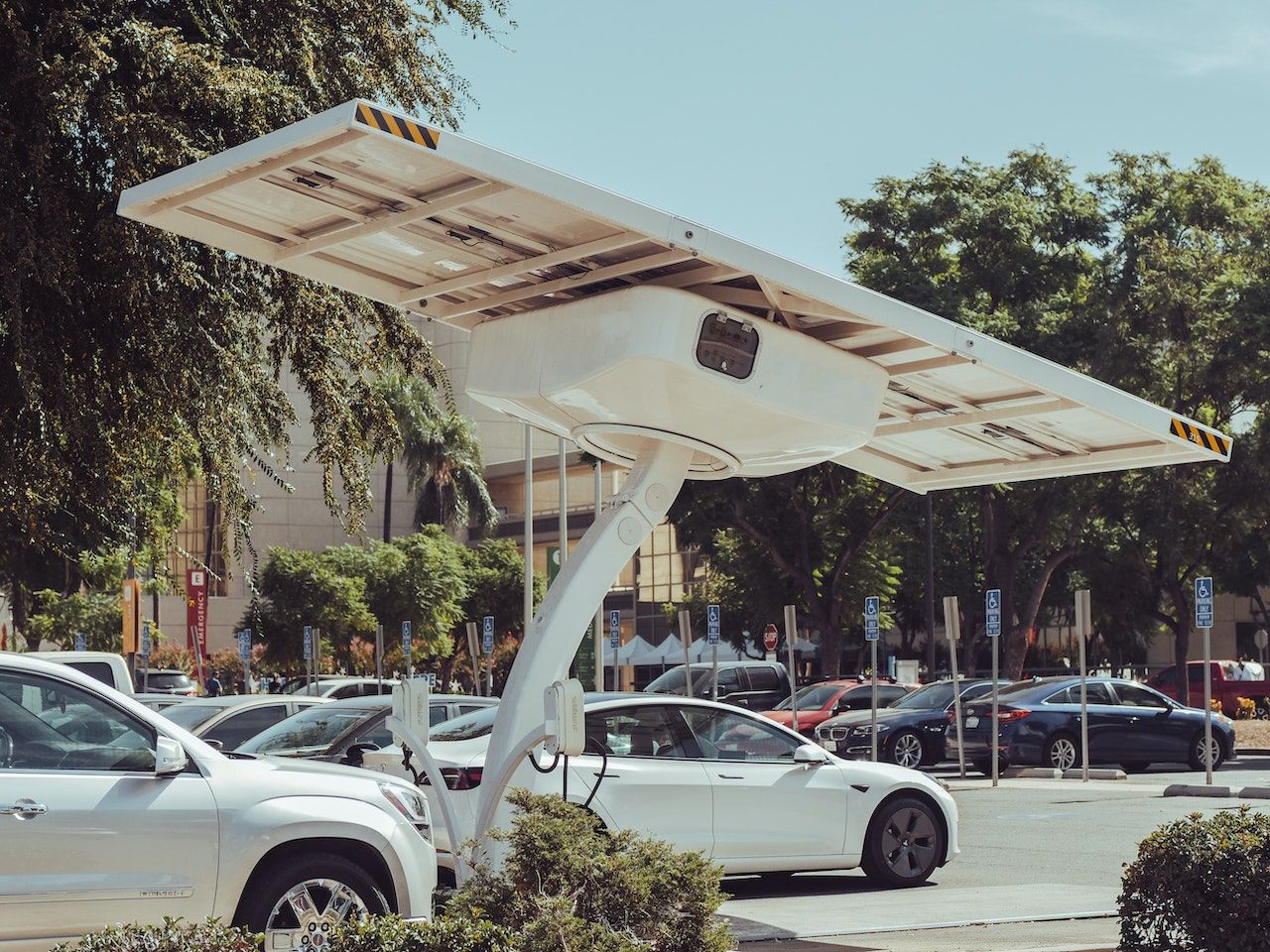ReviewAgent
Top 10 Best EV Chargers 2023
Compare, Review and Buy - EV Chargers for 2023
 Last Updated - April 2025
Last Updated - April 2025


ChargePoint Home Flex Electric Vehicle (EV) Charger
Review For ChargePoint Home Flex Electric Vehicle (EV) Charger
3353 Reviews
- Connectivity TechnologyWi Fi
- Cover IncludedCharging Station and Cable
- Special FeatureTravel
- ColorBlack, Grey
- Input Voltage240 Volts
- Output Voltage240 Volts
- Total USB Ports1
- Item Weight17.6 pounds
- Cable Length23'
- PlugNEMA 6-50, NEMA 14-50, Or Hardwire
- Product DimensionsNA


STOKE VOLTAICS Level 2 EV Charger
Review For STOKE VOLTAICS Level 2 EV Charger
5 Reviews
- Connectivity TechnologyNA
- Cover Includedcharging station, 26-foot cable, charger holder
- Special FeatureNA
- ColorNA
- Input Voltage32A
- Output Voltage190V - 270V
- Total USB PortsNA
- Item Weight15.27 pounds
- Cable Length26'
- PlugNEMA 14-50
- Product Dimensions9.4 x 8.8 x 2.88 inches

Emporia EV Charger Level 2
Review For Emporia EV Charger Level 2
680 Reviews
- Connectivity TechnologyWifi
- Cover IncludedCharging Cord
- Special FeatureNA
- ColorWhite
- Input Voltage240 Volts
- Output Voltage240Volts
- Total USB Ports1
- Item Weight20.1 pounds
- Cable Length24'
- PlugNEMA 14-50
- Product Dimensions12.6 x 9 x 3.5 inches

Grizzl-E Level 2 EV Charger
Review For Grizzl-E Level 2 EV Charger
1822 Reviews
- Connectivity TechnologyNA
- Cover IncludedNA
- Special FeatureNA
- ColorBlack
- Input VoltageNA
- Output Voltage240 Volts
- Total USB PortsNA
- Item Weight20.1 pounds
- Cable Length24'
- Plug NEMA 14-50
- Product Dimensions15.3 x 13.5 x 9.6 inches

Autel Home Smart Electric Vehicle (EV) Charger
Review For Autel Home Smart Electric Vehicle (EV) Charger
117 Reviews
- Connectivity TechnologyBluetooth, Wi-Fi, RS485, Ethernet
- Cover Included12 KW EV Charger, Wall Dock, Wall Anchor, Screw, Installation Guide, Packing List, Amperage Labels
- Special FeatureNA
- ColorDark Gray
- Input Voltage240 Volts
- Output Voltage240 Volts
- Total USB PortsNA
- Item Weight19.06 pounds
- Cable Length25-Feet
- PlugNA
- Product Dimensions18.3 x 14.6 x 9.2 inches

Lectron NEMA 5-15 Level 1 EV Charger
Review For Lectron NEMA 5-15 Level 1 EV Charger
728 Reviews
- Connectivity TechnologyNA
- Cover IncludedCharging station,cable,power cord,led indicator
- Special FeatureFast Charging
- ColorWhite, Black
- Input Voltage240 Volts
- Output Voltage110 Volts
- Total USB Ports2
- Item Weight6.64 pounds
- Cable Length21'
- PlugNEMA 5-15
- Product Dimensions9.45 x 3.5 x 2.4 inches

Autel Home Smart Electric Vehicle (EV) Charger
Review For Autel Home Smart Electric Vehicle (EV) Charger
7 Reviews
- Connectivity TechnologyBluetooth, Wi-Fi, Ethernet, CAN, RS485
- Cover IncludedCharging Station
- Special FeatureNA
- ColorNA
- Input Voltage240 Volts
- Output Voltage120 Volts
- Total USB PortsNA
- Item Weight18.11 pounds
- Cable Length25'
- PlugNEMA 4
- Product Dimensions18.1 x 14.3 x 9.1 inches

AMPROAD iFlow P9 EV Charger
Review For AMPROAD iFlow P9 EV Charger
245 Reviews
- Connectivity TechnologyUSB, Lightning
- Cover IncludedCharging_station
- Special FeatureIP 67 grade, NEMA 14-50 plug, 25 foot cable, SAE J1772 charging connector
- ColorBlack
- Input Voltage240 Volts
- Output Voltage240 Volts
- Total USB PortsNA
- Item Weight16.46 pounds
- Cable Length25'
- PlugNEMA 14-50
- Product Dimensions9.65 x 3.98 x 2.64 inches

JuiceBox 40 Smart Electric Vehicle (EV) Charging Station
Review For JuiceBox 40 Smart Electric Vehicle (EV) Charging Station
943 Reviews
- Connectivity TechnologyWi Fi
- Cover IncludedCharging station,cable
- Special FeatureCharging Indicator
- Color40 Amp
- Input Voltage240 Volts
- Output Voltage240 Volts
- Total USB Ports1
- Item Weight19.11 pounds
- Cable Length25'
- PlugNEMA 14-50 or hardwire
- Product Dimensions23.25 x 15 x 11 inches

Wallbox Pulsar Plus Level 2 Electric Vehicle Smart Charger
Review For Wallbox Pulsar Plus Level 2 Electric Vehicle Smart Charger
849 Reviews
- Connectivity TechnologyBluetooth, Wi Fi
- Cover IncludedEV Charger, Mounting Hardware, Holster Accesory, Instruction Manuals
- Special FeatureFast Charging
- ColorBlack
- Input Voltage240 Volts
- Output Voltage240 Volts
- Total USB Ports1
- Item Weight19.98 pounds
- Cable Length25'
- PlugNEMA 14-50 or Hardwired
- Product Dimensions4 x 7.8 x 7.9 inches
Table Of Content
- ChargePoint Home Flex Electric Vehicle (EV) Charger
- STOKE VOLTAICS Level 2 EV Charger
- Emporia EV Charger Level 2
- Grizzl-E Level 2 EV Charger
- Autel Home Smart Electric Vehicle (EV) Charger
- Lectron NEMA 5-15 Level 1 EV Charger
- Autel Home Smart Electric Vehicle (EV) Charger
- AMPROAD iFlow P9 EV Charger
- JuiceBox 40 Smart Electric Vehicle (EV) Charging Station
- Wallbox Pulsar Plus Level 2 Electric Vehicle Smart Charger
Author: Ferguson
Latest Articles

Our Rating System
Our reviews come from verified users–just like you!
The star ratings are based on the overall rating of each brand. Some reviews are provided via third party suppliers. We encourage you to write a review of your experiences with these brands.
Compare Features
Product Images: |  |  |  |  |  |  |  |  |  |  |
|---|---|---|---|---|---|---|---|---|---|---|
Product Name: | ChargePoint Home Flex Electric Vehicle (EV) Charger | STOKE VOLTAICS Level 2 EV Charger | Emporia EV Charger Level 2 | Grizzl-E Level 2 EV Charger | Autel Home Smart Electric Vehicle (EV) Charger | Lectron NEMA 5-15 Level 1 EV Charger | Autel Home Smart Electric Vehicle (EV) Charger | AMPROAD iFlow P9 EV Charger | JuiceBox 40 Smart Electric Vehicle (EV) Charging Station | Wallbox Pulsar Plus Level 2 Electric Vehicle Smart Charger |
| Connectivity Technology | Wi Fi | NA | Wifi | NA | Bluetooth, Wi-Fi, RS485, Ethernet | NA | Bluetooth, Wi-Fi, Ethernet, CAN, RS485 | USB, Lightning | Wi Fi | Bluetooth, Wi Fi |
| Cover Included | Charging Station and Cable | charging station, 26-foot cable, charger holder | Charging Cord | NA | 12 KW EV Charger, Wall Dock, Wall Anchor, Screw, Installation Guide, Packing List, Amperage Labels | Charging station,cable,power cord,led indicator | Charging Station | Charging_station | Charging station,cable | EV Charger, Mounting Hardware, Holster Accesory, Instruction Manuals |
| Special Feature | Travel | NA | NA | NA | NA | Fast Charging | NA | IP 67 grade, NEMA 14-50 plug, 25 foot cable, SAE J1772 charging connector | Charging Indicator | Fast Charging |
| Color | Black, Grey | NA | White | Black | Dark Gray | White, Black | NA | Black | 40 Amp | Black |
| Input Voltage | 240 Volts | 32A | 240 Volts | NA | 240 Volts | 240 Volts | 240 Volts | 240 Volts | 240 Volts | 240 Volts |
| Output Voltage | 240 Volts | 190V - 270V | 240Volts | 240 Volts | 240 Volts | 110 Volts | 120 Volts | 240 Volts | 240 Volts | 240 Volts |
| Total USB Ports | 1 | NA | 1 | NA | NA | 2 | NA | NA | 1 | 1 |
| Item Weight | 17.6 pounds | 15.27 pounds | 20.1 pounds | 20.1 pounds | 19.06 pounds | 6.64 pounds | 18.11 pounds | 16.46 pounds | 19.11 pounds | 19.98 pounds |
| Cable Length | 23' | 26' | 24' | 24' | 25-Feet | 21' | 25' | 25' | 25' | 25' |
| Plug | NEMA 6-50, NEMA 14-50, Or Hardwire | NEMA 14-50 | NEMA 14-50 | NEMA 14-50 | NA | NEMA 5-15 | NEMA 4 | NEMA 14-50 | NEMA 14-50 or hardwire | NEMA 14-50 or Hardwired |
| Product Dimensions | NA | 9.4 x 8.8 x 2.88 inches | 12.6 x 9 x 3.5 inches | 15.3 x 13.5 x 9.6 inches | 18.3 x 14.6 x 9.2 inches | 9.45 x 3.5 x 2.4 inches | 18.1 x 14.3 x 9.1 inches | 9.65 x 3.98 x 2.64 inches | 23.25 x 15 x 11 inches | 4 x 7.8 x 7.9 inches |
1. Introduction
An electric vehicle (EV) charger is a device used to charge electric vehicles with electricity. This is typically done by connecting the charger to an electric vehicle's battery, either directly or through an external power source. The most common type of EV charger is an AC wall outlet, but there are also DC fast chargers and other types available. EV chargers can be purchased from a variety of vendors, and the cost can vary depending on the type of charger and the manufacturer.
a. What is an Electric Vehicle (EV) Charger?
An electric vehicle (EV) charger is a device used to charge electric vehicles with electricity. This is typically done by connecting the charger to an electric vehicle's battery, either directly or through an external power source. The most common type of EV charger is an AC wall outlet, but there are also DC fast chargers and other types available. EV chargers can be purchased from a variety of vendors, and the cost can vary depending on the type of charger and the manufacturer.

EV chargers come in different sizes and power capacities, so it is important to choose the right one for your needs. Some EV chargers are designed to be portable, while others are more permanently installed. EV chargers can also be either Level 1 or Level 2 chargers, which refer to the power output of the charger. Level 1 chargers typically output 120 volts of alternating current, while Level 2 chargers output 240 volts.
b. Benefits of EV Chargers
EV chargers are beneficial to electric vehicle owners because they provide a convenient and efficient way to charge their vehicle. EV chargers are usually much faster than charging with a standard wall outlet, and some EV chargers are even able to charge multiple vehicles at once. This is especially useful for households with multiple electric vehicles, as it allows for faster charging times and more efficient use of electricity.
In addition to the convenience and efficiency of EV chargers, they can also save money on electricity bills. Many EV chargers are designed to be energy-efficient, meaning they use less electricity than standard wall outlets and can help to reduce electricity bills. Furthermore, some EV chargers are even eligible for government subsidies and other incentives, which can further reduce the cost of ownership.
2. Buying an EV Charger
When it comes to buying an EV charger, there are several factors to consider in order to ensure you get the best product for your needs. From the type of charger to the installation and safety considerations, there’s a lot to think about. To help you make the right decision, here’s a guide to buying an EV charger.
a. Factors to Consider When Buying an EV Charger
When it comes to buying an EV charger, there are several factors to consider. First and foremost, you should determine the type of charging you need. Most EV owners will require Level 2 charging, which is more powerful than Level 1 charging and is capable of faster charging times. You should also consider the amperage of the charger you need, as this will determine the charging speed. Additionally, you should consider the compatibility between your EV and the charger, as well as the installation process and any safety considerations.
b. Types of EV Chargers
When it comes to buying an EV charger, there are several types to choose from. The most common type is the Level 2 charger, which is the fastest and most powerful type of charger. It is typically installed in a home or garage and is capable of charging an EV in a matter of hours. There are also Level 1 chargers, which are slower but more affordable and can be used in public charging stations. Finally, there are DC fast chargers, which are the fastest type of charger and can charge an EV in minutes.
c. Installation and Safety Considerations
When installing an EV charger, it is important to consider safety. You should ensure that the charger is installed in an area that is away from flammable materials and that all wiring is properly insulated. Additionally, you should ensure that the charger is properly grounded and that all connections are secure. Finally, you should consider any local regulations or codes that may apply to the installation of an EV charger.

3. Conclusion
An EV charger is a great investment for any electric vehicle owner. It’s important to understand the different types of EV chargers, their features, and the cost associated with them before making a purchase. This guide has outlined the different types of EV chargers, their advantages and disadvantages, and tips for making the best purchase decision.
a. Summary of Buying an EV Charger
When buying an EV charger, it’s important to consider the type of charger, the features that are important to you, and the cost. Level 1 chargers are the slowest and least expensive, while Level 2 and DC fast chargers are more expensive but charge faster. It's also important to consider installation costs and any maintenance costs associated with the charger. Finally, it's important to read reviews and do research to ensure you are getting the best charger for your needs.
b. Tips for Buying an EV Charger
- Do your research. Make sure you understand the different types of EV chargers and their features before making a purchase decision.
- Understand your needs. Consider the power output, installation requirements, and cost associated with the charger.
- Consider installation costs. Make sure you understand any installation or maintenance costs associated with the charger.
- Read reviews. Read reviews and do research to ensure you are getting the best charger for your needs.


